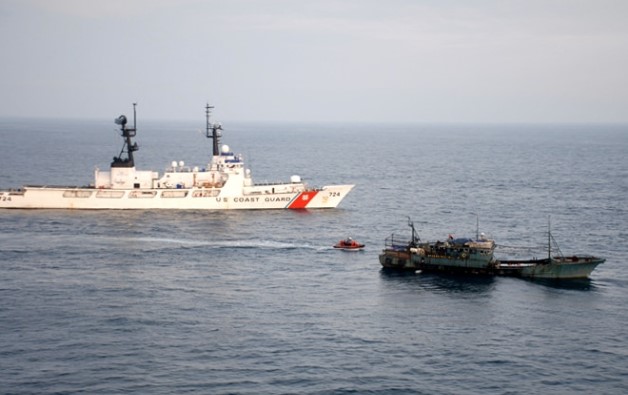The United States Department of the Treasury has taken a firm stance against the Gulf Cartel, one of Mexico’s most notorious and dangerous criminal organizations, by imposing sanctions on five Mexican individuals connected to its illegal operations. These individuals have been found to play a role in criminal activities such as illegal, unreported, and unregulated (IUU) fishing, human smuggling, and narcotics trafficking in the Gulf of Mexico.
Sanctions Against the Gulf Cartel for Illegal Activities
The Gulf Cartel has long been associated with violence, corruption, and exploitation, and its activities have devastating consequences. By engaging in IUU fishing, the cartel not only exploits valuable marine resources but also jeopardizes fragile ocean ecosystems. Furthermore, their involvement in human smuggling and drug trafficking poses serious risks to the safety and security of communities in the region.
These sanctions aim to disrupt the operations of the cartel by freezing any U.S.-based assets owned by the sanctioned individuals and prohibiting them from conducting financial transactions within the United States. This action serves as a clear message that the U.S. will not tolerate the exploitation of natural resources and human lives for criminal gain. These measures also align with broader efforts to dismantle transnational criminal organizations that threaten global security.
The SAFE Act: A Unified Approach to Combat Illegal Fishing
The sanctions imposed by the Treasury Department fall under the Maritime Security and Fisheries Enforcement (SAFE) Act, a significant U.S. law designed to address threats like illegal fishing and maritime crime. This act brings together 21 federal agencies and offices, including the Department of State, the National Oceanic and Atmospheric Administration (NOAA), and the U.S. Coast Guard.
Under the SAFE Act, these agencies collaborate to take a “whole-of-government” approach to combating IUU fishing and related activities. IUU fishing encompasses various harmful practices, such as fishing without licenses, exceeding catch limits, underreporting catches, or operating in protected marine areas. These illegal actions directly harm marine biodiversity, disrupt food chains, and deplete fish stocks, leading to long-term ecological and economic damage.
The SAFE Act also recognizes that illegal fishing often serves as a front for other crimes, such as smuggling and trafficking. The Gulf Cartel’s role in IUU fishing demonstrates how criminal syndicates exploit marine resources as part of their larger illegal operations. By addressing these interconnected issues, the SAFE Act not only protects the environment but also strengthens global security and governance.
The U.S. Interagency Working Group on IUU Fishing, established under the SAFE Act, coordinates efforts to counter illegal fishing and maritime crime worldwide. Through this group, federal agencies share resources, intelligence, and strategies to target transnational crime networks. This collective approach has proven essential in addressing the complex and far-reaching nature of IUU fishing and its associated threats.
The Widespread Impact of IUU Fishing
IUU fishing is a major global issue with devastating consequences for both the environment and human communities. By bypassing regulations, illegal fishing operations deplete fish populations faster than they can recover, causing severe harm to ocean ecosystems. This not only threatens marine species but also disrupts the delicate balance of marine habitats that support biodiversity.
For communities that rely on fishing for food and income, IUU fishing poses a serious threat to their livelihoods. Legal fishing industries suffer economic losses as their resources are depleted by illegal operators. Small-scale fishermen often find themselves unable to compete, leading to job losses and food insecurity.
In addition to environmental and economic harm, IUU fishing is frequently linked to other forms of organized crime. Criminal groups like the Gulf Cartel exploit the vastness of the oceans to conduct drug trafficking and human smuggling alongside illegal fishing operations. These activities create a dangerous cycle of exploitation and lawlessness, further endangering vulnerable communities and ecosystems.
The United States has emerged as a global leader in addressing these challenges. By promoting sustainability and strengthening fisheries governance, the U.S. works with international partners to combat illegal fishing and other maritime crimes. Efforts focus on building stronger international rules and encouraging accountability among countries that operate fishing fleets, manage coastal areas, or serve as ports and markets for seafood.
The recent sanctions against members of the Gulf Cartel highlight the importance of enforcing these rules. By targeting the individuals responsible for illegal fishing and related crimes, the United States is taking concrete steps to protect marine ecosystems, ensure sustainable livelihoods, and hold criminal networks like the Gulf Cartel accountable for their actions.
This comprehensive approach to addressing IUU fishing reflects the broader commitment of the U.S. government to preserving natural resources and maintaining global security. While the Gulf Cartel has long been a source of harm in the region, these sanctions represent a significant effort to curb the Gulf Cartel’s influence and mitigate the damage caused by its illegal operations. Through coordinated actions and international cooperation, the United States continues to lead the fight against environmental exploitation and organized crime.


